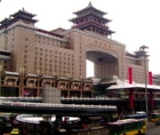
Xuanwu District
Encyclopedia
Xuanwu District is a former district of the Municipality of Beijing
. It lied southwest to the city center. The district was merged into Xicheng District
in July, 2010.
The district spanned over 16.5 km² in size. It was located outside the Imperial Inner City and was predominantly reserved for the lower class. Although considered wealthy once in history and was one of the older districts of the once Imperial City, Xuanwu District had undergone rapid changes in recent history. The district was also the birthplace of the famous Peking Opera. It also housed the Caishikou execution grounds of the Qing Dynasty
.
Xuanwu District has a large muslim
population. In the planning for the 2008 Olympic Games
, many of the district's traditional hutong
were destroyed.
There is a district with the same spelling in Nanjing
, Jiangsu
, though the two are both written and pronounced differently in Chinese (See Xuanwu District, Nanjing
).
Popular destinations in Xuanwu District include:
Beijing
Beijing , also known as Peking , is the capital of the People's Republic of China and one of the most populous cities in the world, with a population of 19,612,368 as of 2010. The city is the country's political, cultural, and educational center, and home to the headquarters for most of China's...
. It lied southwest to the city center. The district was merged into Xicheng District
Xicheng District
Xicheng District is a district in Beijing, China. Xicheng District spans 32 square kilometres, making it the largest portion of the old city , and has 706,691 inhabitants . Its postal code is 100032. Xicheng is subdivided into 15 subdistricts of the city proper of Beijing...
in July, 2010.
The district spanned over 16.5 km² in size. It was located outside the Imperial Inner City and was predominantly reserved for the lower class. Although considered wealthy once in history and was one of the older districts of the once Imperial City, Xuanwu District had undergone rapid changes in recent history. The district was also the birthplace of the famous Peking Opera. It also housed the Caishikou execution grounds of the Qing Dynasty
Qing Dynasty
The Qing Dynasty was the last dynasty of China, ruling from 1644 to 1912 with a brief, abortive restoration in 1917. It was preceded by the Ming Dynasty and followed by the Republic of China....
.
Xuanwu District has a large muslim
Muslim
A Muslim, also spelled Moslem, is an adherent of Islam, a monotheistic, Abrahamic religion based on the Quran, which Muslims consider the verbatim word of God as revealed to prophet Muhammad. "Muslim" is the Arabic term for "submitter" .Muslims believe that God is one and incomparable...
population. In the planning for the 2008 Olympic Games
2008 Summer Olympics
The 2008 Summer Olympics, officially known as the Games of the XXIX Olympiad, was a major international multi-sport event that took place in Beijing, China, from August 8 to August 24, 2008. A total of 11,028 athletes from 204 National Olympic Committees competed in 28 sports and 302 events...
, many of the district's traditional hutong
Hutong
Hutongs are a type of narrow streets or alleys, most commonly associated with Beijing, China.In Beijing, hutongs are alleys formed by lines of siheyuan, traditional courtyard residences. Many neighbourhoods were formed by joining one siheyuan to another to form a hutong, and then joining one...
were destroyed.
There is a district with the same spelling in Nanjing
Nanjing
' is the capital of Jiangsu province in China and has a prominent place in Chinese history and culture, having been the capital of China on several occasions...
, Jiangsu
Jiangsu
' is a province of the People's Republic of China, located along the east coast of the country. The name comes from jiang, short for the city of Jiangning , and su, for the city of Suzhou. The abbreviation for this province is "苏" , the second character of its name...
, though the two are both written and pronounced differently in Chinese (See Xuanwu District, Nanjing
Xuanwu District, Nanjing
Xuanwu District, Nanjing is a district of Jiangsu, China. It is under the administration of Nanjing city.-References:*...
).
Popular destinations in Xuanwu District include:
- Niujie Mosque
- Fayuan TempleFayuan TempleThe Fayuan Temple , situated in the southwest quarter of central Beijing, is one of the city's most renowned Buddhist temples.- History :The temple was first built in 645 during the Tang Dynasty by Emperor Li Shimin, and later rebuilt in the Zhengtong Period of the Ming Dynasty. The temple...
- LiulichangLiulichangThe Liulichang is a famous district in down-town Beijing that is known for a series of traditional Chinese stone dwellings housing selling various craftwork, artistry, and antiques...
-- an antiques market - Huguang Guild HallHuguang Guild HallThe Huguang Guild Hall in Beijing is a renowned Beijing opera theatre. Built in 1807, and at the height of its glory, the Huguang Guild Hall, along with the Zhengyici Peking Opera Theatre was known as one of the "Four Great Theatres" in all of Beijing...

